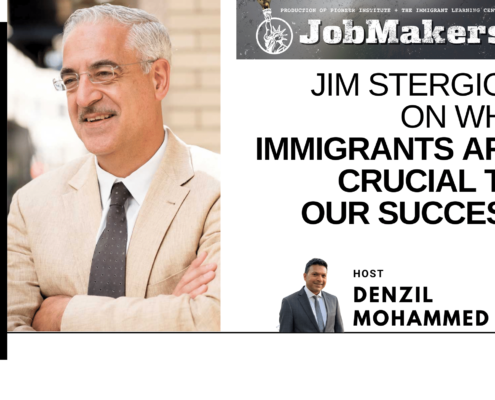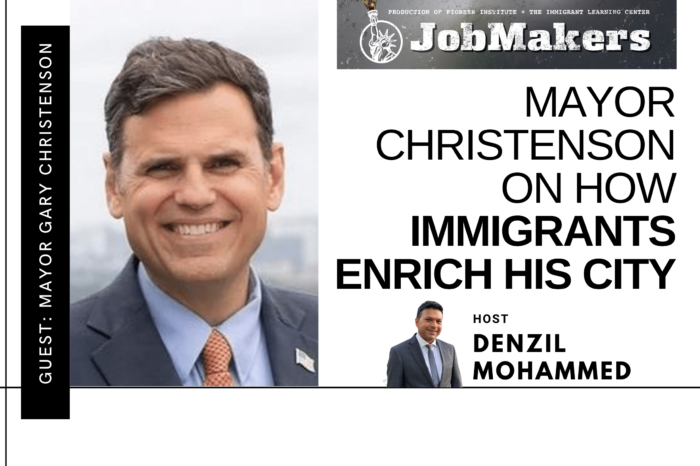Mayor Christenson on How Immigrants Enrich His City
/in Better Government, Economic Opportunity, Featured, JobMakers /by Editorial StaffThis week on JobMakers, host Denzil Mohammed talks with Gary Christenson, Mayor of Malden, the second most diverse city in Massachusetts, with almost 43 percent of its residents born outside of the United States. It’s also home to The Immigrant Learning Center, the co-producer of this podcast. It’s always been a gateway city for immigrants and refugees: from Jews fleeing for safety after World War II, to Eastern Europeans and Vietnamese seeking democracy and freedom, to immigrants from China, Morocco, Brazil and Haiti seeking the American Dream. For Mayor Christenson, it is this diversity that gives Malden its strength, and assures him of a strong, proud future. He looks to the revitalization of downtown with its disproportionate number of immigrant-owned businesses, and talks with us about managing the relationships between long-time residents and new immigrants, the reaction of the city to hate crimes after the Boston Marathon bombing, how much immigrants have given back to their new home, and his stance on sanctuary cities, in this week’s JobMakers.
Guest:
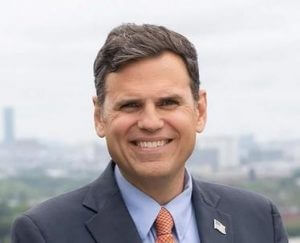 Gary Christenson has been Mayor of Malden, Massachusetts since 2012. His political career began as a budget analyst, revenue director and special assistant reporting to Tom Finneran on the Massachusetts House Ways and Means committee from 1994-1997. He also served as budget director at the Middlesex County Sheriff’s Office. Christenson was appointed to the Malden School Committee, and served as a city councillor of Ward 1 in Malden for seven years. He became Chairman of the Finance Committee and then City Council President, before being elected mayor. Christenson is a triple alumnus of Suffolk University. He has received a Bachelor’s degree in political science science and business management in 1990 and a Masters Degree in public administration in 1992. In 2003, Gary received his Juris Doctorate from the Suffolk University Law School.
Gary Christenson has been Mayor of Malden, Massachusetts since 2012. His political career began as a budget analyst, revenue director and special assistant reporting to Tom Finneran on the Massachusetts House Ways and Means committee from 1994-1997. He also served as budget director at the Middlesex County Sheriff’s Office. Christenson was appointed to the Malden School Committee, and served as a city councillor of Ward 1 in Malden for seven years. He became Chairman of the Finance Committee and then City Council President, before being elected mayor. Christenson is a triple alumnus of Suffolk University. He has received a Bachelor’s degree in political science science and business management in 1990 and a Masters Degree in public administration in 1992. In 2003, Gary received his Juris Doctorate from the Suffolk University Law School.
Get new episodes of JobMakers in your inbox!
Read a Transcript of This Episode:
Please excuse typos.
Denzil Mohammed:
I am Denzil Mohammed, and this is JobMakers.
Malden, Massachusetts, the second most diverse city in the Commonwealth. After Chelsea with almost 43% of us residents born outside of the United States. It’s also home to the immigrant learning center, the co-producer of this podcast. So a good location for free English language program. Maldens always been a gateway city for immigrants and refugees from Jews fleeing for safety after world war two to Eastern Europeans and Vietnamese seeking democracy and freedom to immigrants from China, Morocco, Brazil, and Haiti seeking the American dream today from me or Gary Christianson. It is this diversity that gives Malden its strength and assures him of a strong, proud future. He looks to the revitalization of downtown as its disproportionate number of immigrant owned businesses, the dizzying array of cuisines on offer and the very entrepreneurial spirit. That’s the fuses its immigrant populations. He talks with us about managing the relationships between the term residents and new immigrants, the reaction of the city to hate crimes after the Boston marathon bombing, how much immigrants have given back to their new home and his stance on century cities in this week’s job makers, Mayor Gary Christianson, welcome to the job makers podcast.
Mayor Gary Christenson
Thank you so much for having me, always an honor.
Denzil Mohammed:
So what is it like running the second most diverse city in the Commonwealth?
Mayor Gary Christenson
It probably is the greatest aspect of serving as mayor, because I have learned things that I know that I never otherwise would, if not the living in one of the most diverse cities in the state of Massachusetts. For example, I met with a community group a couple of years ago, and when they told me the name of the country, I didn’t even know it existed. I actually had to go to a map to look it up. It was Eritrea. And,uagain, if not for them being here and being part of this diverse city that we live in, I might have never known that. And so to me, that’s one of the greatest benefits of, of living here in Malden.
Denzil Mohammed:
And you’re a lifelong Malden resident. How have you seen immigration shaped this city? And in what ways? I mean, I, as far as I can tell Malden has always been a gateway city for different refugee and immigrant groups, right?
Mayor Gary Christenson
Yeah. I guess how has it shaped our city from religion to culture, to my favorite, which is a food it’s had a profound impact on who we are and where we are going. And I can’t tell you the number of people who end up coming here now mention the diversity as one of the attractions on why they come to our city.
Denzil Mohammed
So you think that this diversity is a strength of ours.
Mayor Gary Christenson:
We touted every chance we get. And you know, we just don’t, we try not to just talk the talk. We’re now trying to take what has been happening to our city and have it permeate throughout everything we do in Malden. So for example we now have our first diversity equity and inclusion officer, just a couple of offices down from me. Her name is Bybiose Larochelle, and she now is working very hard to have the government reflect what Malden has become, which is again, one of the most diverse cities in our state. So she sits on every hiring committee she’s involved with helping to promote the vaccine to underserved populations in our city. And we want to make sure that Malden is not just known as the most diverse, but actually practices and preaches on making sure that our community is, is welcoming and safe for us all.
Denzil Mohammed:
So we know from our own research and you would know as the person who runs this city, that immigrants are inherently entrepreneurial. Just the idea of packing a suitcase and leaving their family and friends and their culture and their food behind is itself. An entrepreneurial act. How has that entrepreneurial spirit immigrants in Malden shaped the local economy?
Mayor Gary Christenson:
Just the other day, we cut the ribbon to the new Maplewood meat market over on in Maplewood square. And the owners, they one was from Peru and the other one was from Mexico, I believe. And they are not only the owners, but they’re serving the goods that are native to their original countries. And again, that would not be the case, if not for them wanting to set up their business here in our city. So we went down that not only congratulate them on this risk, because that’s what it is when you’re opening a new business, but thank them as well for sharing what they have experienced and learned growing up with our, our community. So that’s just one example of many that we work with on a daily basis here in Malden.
Denzil Mohammed:
I remember talking to Shane Smith on this podcast who runs Hugh O’Neill’s Irish pub. And, you know, he mentioned when he, when he first opened that downtown mall and wasn’t the vibrant hub that it is now with pubs and restaurants and cafes and stores particularly looking at the downtown area, how have immigrants played a role in revitalizing downtown Malden over the years?
Mayor Gary Christenson:
Well, I would encourage your listeners to, to come see it, to experience it firsthand, but they have, single-handedly brought our city back and there were times when people weren’t sure about whether that would ever be possible again, but they have done it. Just go up one side and down the other, and you’ll see just this afternoon, I’m going to go over to the gallery at 57 pleasant street, which consists of a number of immigrant artists who are going to be celebrating the second anniversary of that store opening. And again, that would not have happened without their willingness to get involved and help us bring back Malden square from where it once was.
Denzil Mohammed:
And I just can’t help. But think of the sheer diversity, you talk about someone from Peru and Mexico Eritrea, I mean, Taiwan, Hong Kong, Vietnam Haiti, just so many, so much rich diversity here. And we take it for granted that just in America, that we have all this great diversity of food. For instance, you know, America’s favorite fast food chain is Taco Bell. We have immigrants to thank for the fact that we can have, we can choose on a Friday night Thai food or Scottish food or Irish food or Chinese food.
Mayor Gary Christenson:
Well, I can tell you the difference here. A number of our students who graduate Malden high school and go off into the big world, always come back and tell us that one of the advantages of attending school in our city is that when they get out, they’ve experienced it all whereas students that they are meeting for the first time, it takes them several years to adjust and adapt to experiencing new cultures, new religions, new foods, but not students that come from our cities. So, you know, to me, that’s one of the great things about Malden.
Denzil Mohammed:
You’ve mentioned students, and I want to get back to that in a second, but what has Malden done over the years? How has your relationship with immigrant business owners in particular evolved? Like what have you, what have you done right? That other cities have not done right? When it comes to really fostering that entrepreneurial spirit?
Mayor Gary Christenson:
Yes. You know, again, as I mentioned, our diversity equity inclusion officer now Bybiose Larochelle has been working with the different community groups throughout Malden to take us to that next level, because we’ve known now for some time that we are diverse and we appreciate it and enjoy it, but now it’s time to take it to where it should go, which is to again, be in a place that everybody can participate in. So I would say that is where we’re going next, which is, you know, having people working in the government that reflect our community having documents, translated meetings, translated so people could participate in eventually run for political office.
Denzil Mohammed:
So you mentioned students a little bit, a little while ago. Part of your progress in Malden has been the creation of 1500 jobs from Malden’s teams, exposing them to the job interview process, giving them work experience, arming them with career readiness. Given that 50%, 57% of Malden high school students don’t count English as their first language. How do you see reaching such a diverse group of students? How have they been able to engage with these opportunities?
Mayor Gary Christenson:
We go to them, we reach out to them, we roll out the red carpet for them. We make it a point to find those students who otherwise would not get involved and take that step. We try to find people that we’ve never met and we have no connection with, because again, it’s opportunities like the summer youth employment program that good help determine who that next teacher is, who that next police officer is. That next entrepreneur is
Denzil Mohammed:
One of the most beautiful things to see in Malden is when the bell rings and the high school students come streaming out, all the elementary schools students. And they’re from every different color, every different Stripe, every different background, but they’re all friends, they all get along. They may wear a hijab or, you know, something else, but they all get along. And it’s almost like this lesson in immigrant integration and inclusion and belonging. Has it been challenging over the years? Just you talk about all this community outreach and meeting people where they’re at and has it been like a learning experience for you?
Mayor Gary Christenson:
It certainly hasn’t been a challenge. It’s been something that I have been proud and honored to be a part of, because again, I, listen, my family said growing up the whole point of why we’re here is to learn, share, and grow. That’s the whole point of it to make it better for the next group of residents behind us, for them then to be living in a place that’s greater than we found it. And so I’ve been able to do that by, you know, living here in Malden. Again, I’ve seen, I’ve heard, I’ve learned things. It actually has helped me to rarely need a vacation because I feel like here in Malden, I’m on vacation all the time. I’m not sure
Denzil Mohammed:
You want to say that before your next campaign.
Denzil Mohammed:
But what, what, what do you think re it’s it’s, it’s almost ironic and tragic that you say the lesson was to make it easier for the people who come after you, because so often the groups that are, that are, have settled here, disliked the groups that come after them, we’ve seen that it’s a cycle in US history. You know, who does America belong to? And I think, I would venture to suggest it belongs to anyone who believes in the American dream, you know, who had that freedom and opportunity. What do you think sets Malden apart when it comes to embracing its newest foreign-born residence and ensuring that they thrive?
Mayor Gary Christenson:
I would say it’s just a willingness to work with everyone to make our community the best it can be. I mean, we try here to take every call, every email, no matter what your stature is in life, you know, so, you know, there was a time when it was, we knew, you know, what they do, but we’ve tried hard over the years to let that not be the case here. So we, I believe we truly have a, an open door policy. I’ll give you an example. We had someone reach out to us from Morocco the other day. I don’t even know how she got my text number, but she got my cell number. She texted me, I couldn’t remember who she was or where I met her, but within 24 hours sitting in the mayor’s office trying to help address, you know, her ratio, which is serious, but we think we might have some solutions for her, but the point I’m trying to make is that again, that was something we could have said, you know, schedule it a month out, you know, find out who she is, all that stuff.
Mayor Gary Christenson:
But we try not to do that here. We had her here in 24 hours.
Denzil Mohammed:
So it hasn’t been entirely rosy experience here in Malden. I think there have been some tensions with longtime residents and newer residents,and things can get very heated when it comes to, you know, national or local tragedies. We did have an incident soon after the Boston marathon bombing where a Syrian woman was punched by a resident of Malden,in front of her toddler, you know, taking her child to daycare. But the city’s response was pretty remarkable, right?
Mayor Gary Christenson:
Yes, that’s in the eye of the beholder, but our instant reaction was to swarm her, you know, to be with her, to let her know that that is not something we’re known for or tolerate. And the thing I’ll remember most about that is the number of people who came to her defense and to reassure her that that was, that was an anomaly. And I think as a result, we were able to survive that together. You know, we are a community for all. I mean, just look at the latest census track that just came out. When you look at the map of Malden, it’s pretty evenly distributed across the five square miles. So as opposed to another city who might have a, you know, a segment or a population in this corner, and then the rest of the city is another population, here in Malden, you wouldn’t know where you are at any given time in any part of the city.
Denzil Mohammed:
Over the years, how has Malden sort of managed these tensions or this relationship of the longer term residents versus the newer ones?
Mayor Gary Christenson:
I would say it’s creating an atmosphere, again, where people are welcomed and respected, no matter what generation they’re from. So we observe, we celebrate different holidays, we observe and celebrate different religious traditions. We eat different foods. And I think that’s how we’ve tried to do it here in the government. So I guess in other words, lead by example. So if you notice on our social media, my social media channels, always trying to promote, you know, a different culture or a different religion, a different food. And I think when people see the leaders of the city doing that, I think over time, people tend to accept it. You know, when they see their elected officials and managers, department heads, police chiefs, fire chiefs, I think that’s how we’ve been able to do it. Because again, we want to demonstrate that no matter where you are or where you’re from, you’re just as part of Malden as anybody else.
Denzil Mohammed:
One thing that you did over the last federal administration, you know, there were a lot of movements across the country to where cities were insisting that they be more welcoming and that they take a sort of stand when it came to protecting their immigrant populations. And as we know, about 20% of the immigrant population in Massachusetts has no legal status. They’re undocumented. Malden was one of the cities that did not proclaim that it was a sanctuary city. And the reason was that coming from you and your administration was that it’s already a welcoming and protective place. Can you expand on that a little bit as why you took that decision? Not to make Malden a sanctuary city?
Mayor Gary Christenson:
No. I mean, that was the flavor of the day to become a sanctuary city, but in actuality, what did it really mean besides the potential for pro protracted legal battles and the potential loss of aid? You know, at that time, we didn’t know whether that would mean that some of the grants that we were relying on to help people who were in need of it the most would be at risk. So that was why at the time we didn’t feel the need to sign on to becoming a sanctuary city, which I think over time then changed to something else, et cetera. I just know, I think for us, and I think, I believe the other branches of government, they felt the same way that, you know, we were long past having to label ourselves as something other than what we have always been, which is a place, you know, that everybody can live, work, worship
Denzil Mohammed:
We’ve, you and I have seen immigrants contribute to the city as business owners, as workers through cultural events, building it up and enriching it every day. There is a huge narrative out there about immigrants as takers, refugees as takers. What is your view on that? How have you seen immigrants give back and have they given back over time more than you’ve given them or the government has given them?
Mayor Gary Christenson:
I haven’t seen takers. I’ve seen people, my experience here that like you outlined Denzil at the beginning, that just want a chance, an opportunity to live out their dreams. And so I’ve seen that as we’ve gone around to the different businesses, as I’ve talked with students in the different schools that we have here. And even in the houses of worship, when I go through there that, you know, people are just looking for an opportunity to achieve their lifelong dream.
Denzil Mohammed:
That’s a very powerful way to end this. Mayor Christenson, thank you so much for joining us and JobMakers. This was really a fascinating discussion and I hope other municipalities listened to this and be guided accordingly as to how, as you say, you can help people fulfill their dreams and you can see how much they can give back.
Mayor Gary Christenson:
That’s it. That’s what it’s all about. Hey, and thank you Denzil, to the Immigrant Learning Center. I am certain we would not be having this conversation if not, for all the work that you have done over the years. So thank you.
Denzil Mohammed:
Jobmakers is a weekly podcast about immigrant entrepreneurship and contribution produced by pioneer Institute, a think tank in Boston and the Immigrant Learning Center, a not-for-profit that gives immigrants a voice. Thank you for joining us for today’s fascinating story on the benefits of welcoming immigrants and refugees to the U S if you have feedback or know someone, you should talk to email Denzel that’s, D E N Z I L @ jobmakerspodcast.org. I’m Denzil Mohammed. Join us next Thursday at noon for another episode of jobmakers.
Recent Episodes:
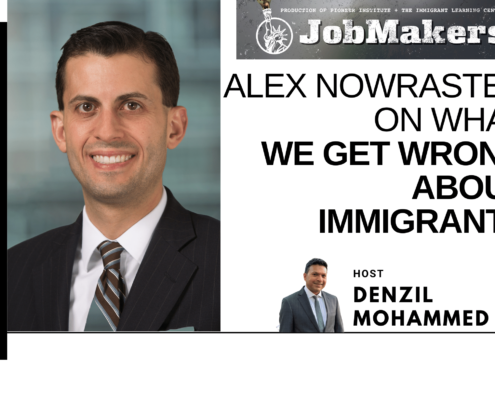
Alex Nowrasteh on What We Get Wrong About Immigrants
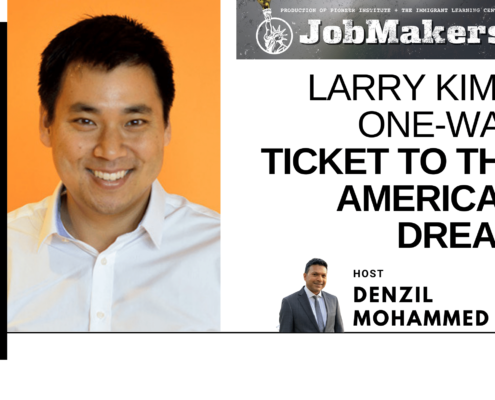
Larry Kim’s One-Way Ticket to the American Dream
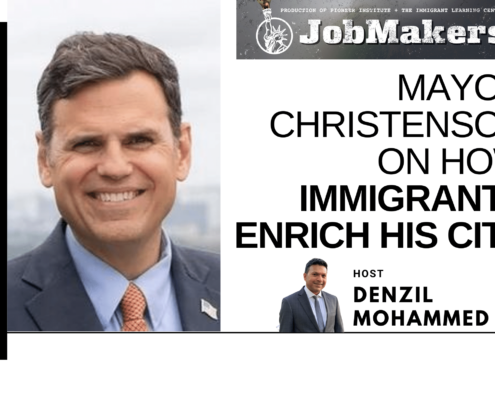
Mayor Christenson on How Immigrants Enrich His City
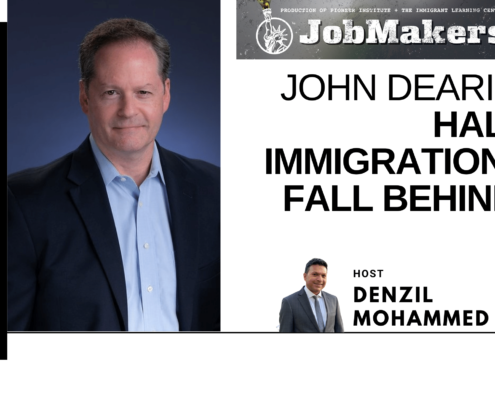
John Dearie: Halt Immigration? Fall Behind
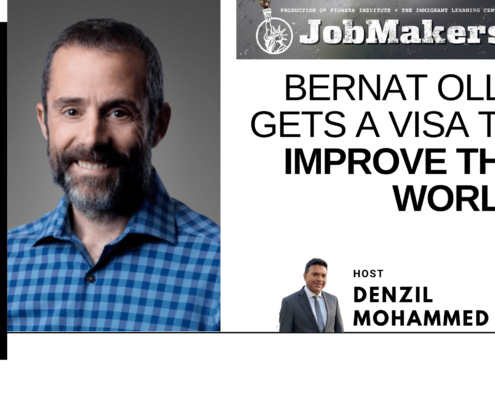
Bernat Olle Gets a Visa to Improve the World
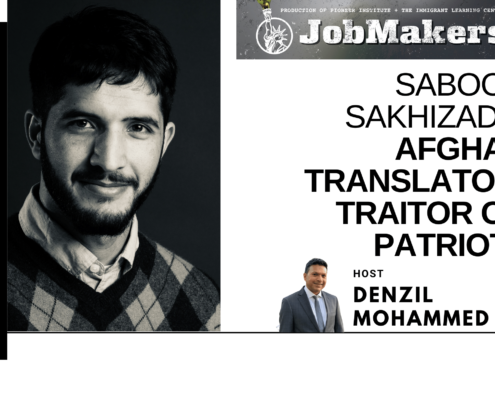
Saboor Sakhizada, Afghan Translator: Traitor or Patriot?
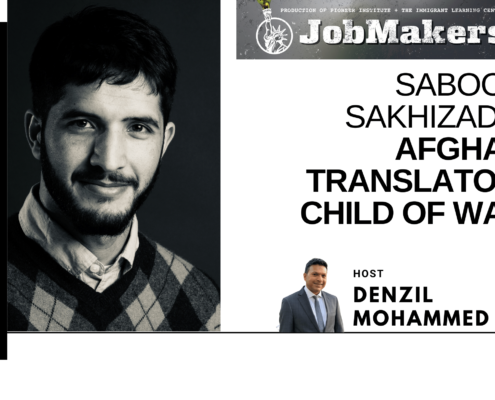
Saboor Sakhizada: Afghan Translator, Child of War
